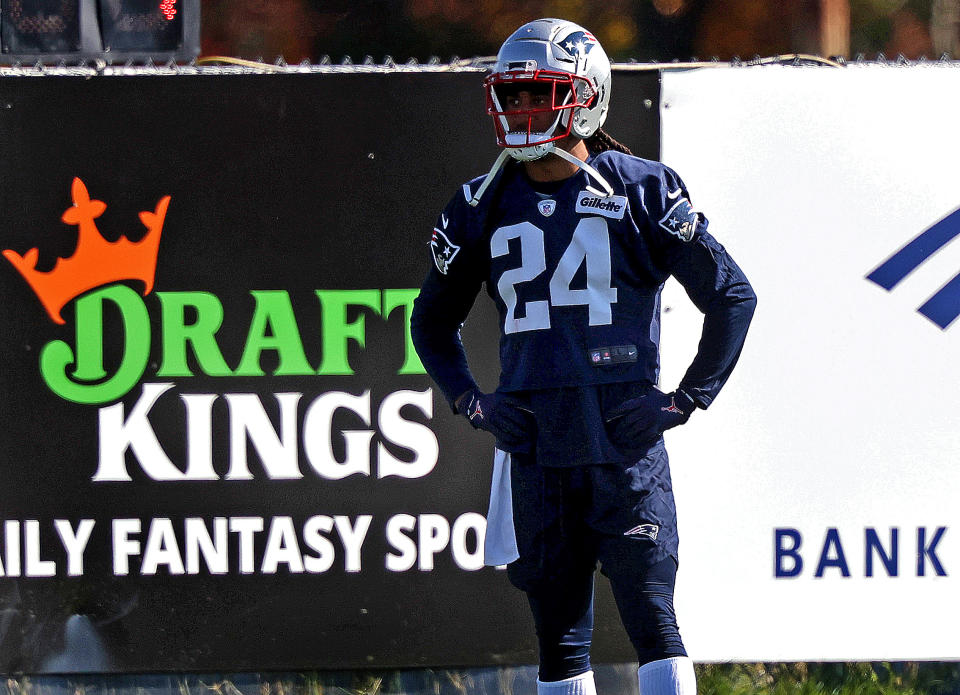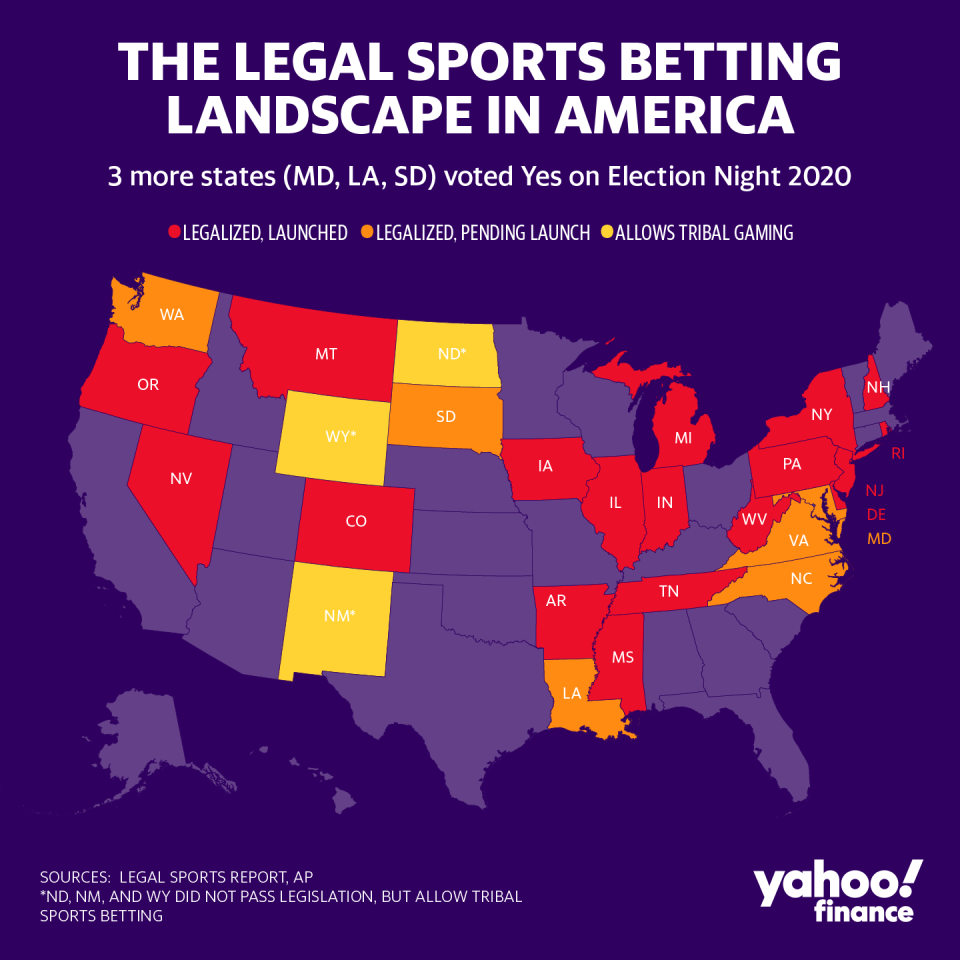DraftKings, NFL both hope sports TV ratings dip was due to election
DraftKings on Friday beat expectations with its Q3 earnings, reporting revenue of $133 million (edging the $131.7 million analysts expected) and loss per share of 57 cents (less than the 61 cents expected). The company also says it has hit 1 million unique “payers” per month, a 64% increase from one year ago.
Shares spiked on Friday mostly on the company’s raised guidance for 2020 revenue to a range of $540 million to $560 million. That guidance suggests revenue growth of 25% to 30% for 2020 compared to 2019—despite live sports getting put on pause for nearly four months due to COVID-19.
The growth for DraftKings has also come despite a significant TV ratings decline across almost all the major pro sports. According to Nielsen data, viewership of the 2020 MLB World Series on Fox was a record low, down 32% from the previous record low in 2012; the 2020 NBA Finals on ESPN were down 51% from last year; the NHL Stanley Cup Finals on NBC were down 61% from last year; the 2020 Kentucky Derby on NBC, moved from May to September, was down 49%. (The WNBA was an exception, with its viewership up 15% for its full season; NASCAR viewership for its full season dipped just 2%.) NFL viewership was down 6% through Week 9.
It’s a phenomenon you would think would be damaging to a fantasy sports and sports betting operator like DraftKings.
But CEO Jason Robins says that even as TV ratings have dipped, DraftKings has seen year-over-year user growth across all its sports, “so my guess is that where there are drop-offs, it’s the very casual viewers and not the people we’re after.”
The cause of the ratings dip has been the subject of much debate. Was it the distraction of the presidential election? Or the mental toll of the pandemic? Too many sports leagues returning to play all at once? Were some viewers turned off by social justice messages? Is it simply too weird to see game broadcasts with no in-person fans?
Robins favors the election explanation.
“It's nice to speculate, but no one really knows,” he told Yahoo Finance. “I do recall four years ago, when the NFL dipped and everyone was like, 'Is this the end of the NFL?’ It turned out the election had a bigger impact than people thought... So we’ll have to see if that’s the case here, but just intuitively it makes sense that when a large percentage of the country’s attention is taken away from sports and they’re glued to channels like CNN and Fox News instead, they’re probably not going to have the same type of viewership levels in the NFL that they would have in a non-election year. So that’s my guess, but there’s so many moving parts this year that it’s really hard to tell.”

Will NFL rebound post-election?
The NFL, behind closed doors, has favored the same explanation: that the presidential election took attention away from football.
In 2016 the NFL saw a similar ratings decline at the start of its season, and at the time its leadership told franchise owners the election was to blame. This time, the league is reportedly taking the same tack.
But that would suggest that with the election out of the way, NFL ratings should quickly rebound. That’s not what happened in Week 9, which was the first full slate of games after the election and concluded on Nov. 9. According to Sports Media Watch, every game window in Week 9 declined from the year prior except for the Steelers vs Cowboys in the CBS national afternoon window, which gained 2% from last year. (Saints vs Buccaneers was the least-watched Week 9 NBC Sunday Night Football telecast in three years, but it was also a blowout.) Viewership fell 2% in Week 9.
On the other hand, the NFL ratings dip overall has lessened in the past few weeks. Viewership had been down 12% through Week 5, but is down only 6% through Week 9, so the trend is improving.
If you ask FanDuel CEO Matt King, the sports ratings dip was caused by the glut of sports more than anything else. “I think people just aren't used to watching NBA basketball in August, and they aren't used to the Kentucky Derby being in the fall,” King says. “And I think as you see sports return to their normal calendar, you'll see the ratings swing back. The other reality is when the NFL kicked off, you just had a lot of sports going on." King, like Robins, says the dip hasn’t hurt FanDuel Group, which grew its revenue 80% year over year in Q3. (FanDuel is owned by Ireland-based Flutter Entertainment.)

Still betting on TV ads
DraftKings and FanDuel continue to spend big on customer acquisition. DraftKings spent $100 million on marketing in the first half of the year; FanDuel expects to spend $185 million in the second half. The two companies have flooded TV and radio airwaves with ads promoting their legal sportsbooks, which is reminiscent of 2015, when they were going head-to-head promoting their daily fantasy sports (DFS) apps.
DraftKings CEO Jason Robins says there’s good reason their 2020 ad blitz feels like their 2015 ad blitz: the legal online betting market is now in its early innings, just like the DFS market was at that time.
“This is the customer acquisition stage,” Robins says. “To put it in perspective, we had two states live with online sports betting at the start of last NFL season, we’re in 10 now. So that’s a lot of new customers that are able, for the first time ever, to bet on the NFL on DraftKings, and we’re working hard to get them on the platform... The natural expectation one might have, the natural pattern you would expect the industry to follow—and it was no different with daily fantasy sports—is there’s a heavy customer acquisition period, and then there’s a profit-taking period that occurs afterwards. But the interesting thing here is it’s happening state by state, so you’re going to have states like New Jersey that might be in their fourth or fifth year at a time when other states are in their first year.”
FanDuel CEO Matt King, in an interview earlier this week, echoed the same: “We think we're in the first or second inning” of sports betting legalization, he said.
—
Daniel Roberts is an editor-at-large at Yahoo Finance and closely covers sports business. Follow him on Twitter at @readDanwrite.
3 more states just voted to legalize sports betting
The biggest storyline of the 2020 NFL season isn’t the pandemic—it’s gambling
As live sports return to TV, so do DraftKings and FanDuel ads
Michael Jordan gets equity stake in DraftKings, stock surges
IRS guidance on fantasy fees could spell major trouble for DraftKings, FanDuel
DraftKings completes merger to go public, even as sports are shut down
College football cancellations will cost big universities billions of dollars
